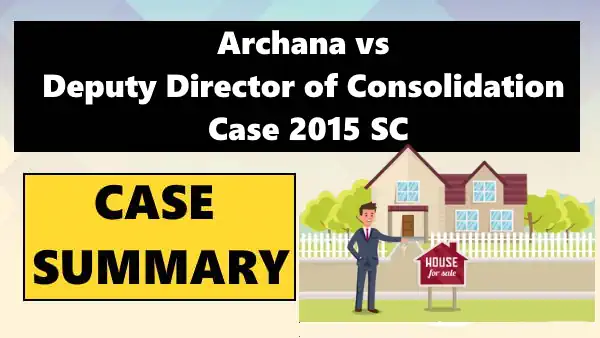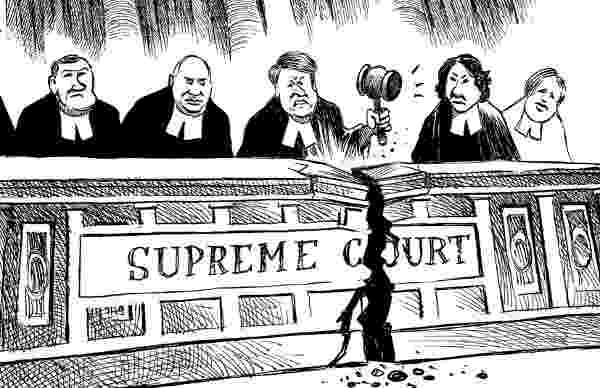Archana vs Deputy Director of Consolidation case gave a landmark judgment declaring the rights of a daughter on the ancestral property and the coparcenary status of females.
FACTS:
- In 1989, Hardeo Singh, grandfather of Archana, the petitioner, left behind the ancestral property which was then inherited by his sons and their sons.
- The inheritors of ancestral property, Uttam Singh and Khajan Singh and their sons, converted the property into the Joint Hindu Family property of which Uttam Singh was ‘Karta’ who acted up to 1989.
- Khajan Singh and Uttam Singh executed sale deeds dated 14.11.2005 in favor of Veer Singh and on its basis name of Veer Singh was mutated in the revenue record by order dated 19.12.2005.
- In 2013, Archana filed the petition against the sale deed executed by Uttam Singh based on an amendment of sec 2(5) Hindu Succession act 2005, which states that the petitioner has become a co-parcener along with her father and brothers.
- The land in dispute was agricultural land and the provisions of Uttar Pradesh Zamindari Abolition and Land Reforms Act, 1950 (herein after referred to as U.P. Act No. 1 of 1951) apply to it.
LEGAL ISSUES:
Q. Who possesses the right to make law over the subject “land and land tenure”?
Entry-7 of List III–Concurrent Legislative List of Government of India Act, 1935 used the phrase “save as regards agricultural land”, from which, rights in or over land, and land tenures were within the exclusive domain of State Legislature under Government of India Act, 1935.
The Constitution, Entry-5 of List III–Concurrent List, uses the phrase “all matters regarding which parties in judicial proceedings were immediately before the commencement of this Constitution subject to their personal law.”
From which, it has been again clarified that rights in or over land, and land tenures were within the exclusive domain of State Legislature under Entry-18 of List- II-State List. Thus, State Legislature alone has jurisdiction to make law in respect of rights in or over land, and land tenures, under which U.P. Act No. 1 of 1951 was enacted.
The word “right in” is a comprehensive phrase and includes the right of inheritance and devolution of interest.
Q. Is there overlap between subjects mentioned in Entry-18 of List-II-State List and Entry-5 of List-III-Con-current List? If there is overlapping, which law will prevail?
No, however, if there will be any overlapping U.P. Act No. 1 of 1951 will prevail over the Hindu Succession Act, 1956 under Article 254(2) of the Constitution. As held above, the subject “rights in or over land, and land tenures” is mentioned in Entry-18 of List-II-State List which includes the right of inheritance and there is no overlapping of the subjects between Entry-18 of List-II-State List and Entry-5 of List- III-Concurrent List.
Under Article 246(3) of the Constitution, State Legislature alone has jurisdiction to make law regarding rights in or over land, and land tenures including the right of inheritance.
Subject “succession” mentioned in Entry-5 of List Ill- Concurrent List has a limited application as provided under Section 14 of Hindu Succession Act, 1956.
Even if it is treated that subject “succession” is falling under Entry-5 of List-III-Concurrent List, assent of President of India has been obtained regarding U.P. Act No. 1 of 1951 in case of repugnancy also, U.P. Act No. 1 of 1951 will prevail over Hindu Succession Act, 1956 under Article 254(2) of the Constitution.
Q. Whether Hindu Succession (Amendment) Act, 2005 was enacted in the exercise of powers under Article 253 of the Constitution and has an overriding effect?
Yes. Union of India took part in the World Conference on Human Rights in Vienna, on 25.6.1993, and made a declaration to eradicate all forms of discrimination against women up to the year 2000.
In pursuance of the above declaration, the Law Commission of India made a detailed survey for awarding property rights to women and reform under Hindu Law.
Law Commission recommended deleting Sec 4(2) of Hindu Succession Act, 1956, so that the provisions of Hindu Succession Act, 1956 will apply to agricultural land also as an actual contribution of the women in the cultivation of agricultural land was found more than the men it was thought proper to give equal right of inheritance to women for agricultural land as well.
Hindu Succession (Amendment) Act, 2005 was enacted to fulfill the declaration made before the United Nations Organization and Art 51(c) it will have an overriding effect under Art 253 of the Constitution.
RATIO & DECISION:
J. Ram Surat Ram (Maurya) led the bench.
The petitioner was a coparcener of the disputed land. Her objection was maintainable under the Act.
Orders of consolidation authorities are illegal and liable to be set aside. Section 171 of U.P. Act No. 1 of 1951 makes gender discrimination between descendants of a tenure holder, regarding inheritance and is void under Article 13 of the Constitution of India as it bridges the right of equality of daughter regarding inheritance in agricultural land and contravenes Articles 14 and 15 of Constitution of India.
Under the law, Joint Hindu Family Property is a trust for the benefits of the members, living and to be born. Therefore, the sale deed dated 14-11-2005 in favor of Veer Singh was void.
CONCLUSION
- Parliament and State Legislature, both derive their power to make law relating to “succession” from Entry-5 of List-III-Concurrent List of Seventh Schedule of the Constitution.
- Parliament has the power to make a law under Article 246(2) regarding subjects mentioned in List-III-Concurrent List. In case of inconsistency between a law made by State Legislature i.e. Section 171 of U.P. Act No. 1 of 1951 and a law made by Parliament i.e. Hindu Succession Act, 1956 (as amended), the provisions of the Hindu Succession Act, 1956 (as amended) will prevail under Article 254.
- In pursuance of the above declaration, the Law Commission of India made a detailed survey for awarding property rights to women and reform under Hindu Law.
Found Archana vs Deputy Director of Consolidation case summary useful? We have a bunch of useful topics from Family law that will help you in your preparation here >>> FAMILY LAW
Check out our YouTube Channel for free legal videos >>> LAW PLANET YT





